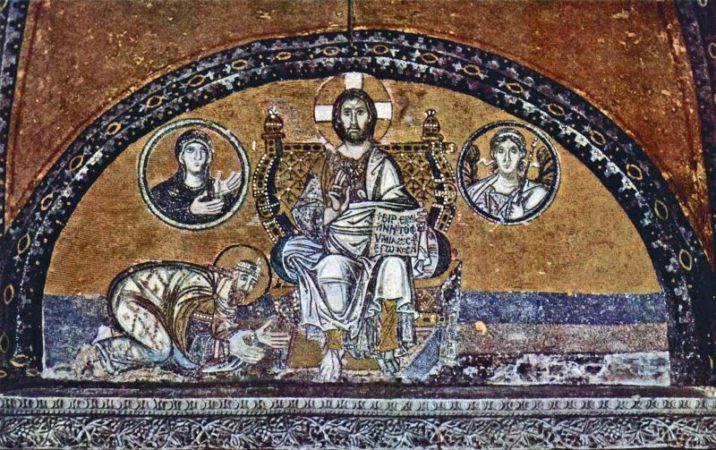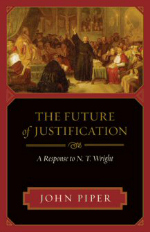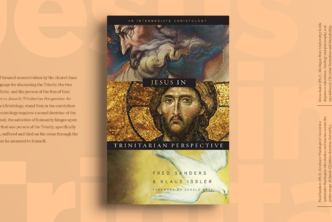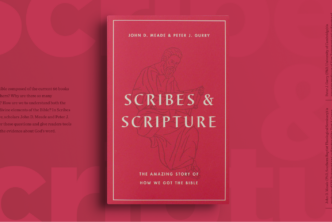Welcome back to the third installment of theLAB’s Hot Seat interview with Matthew Bates on his new book, Salvation by Allegiance Alone. In this segment, we engage Matt on his perception of the gospel message, whether “allegiance alone” can correct current errors in popular soteriology, and where the gospel actually “climaxes.” We end part 3 with a challenge to his translation of pistis based upon the ancient evidence outside the Bible.
Be sure to check out Part 1 and Part 2 if you haven’t already, and make sure to sign up for updates in anticipation of our final segment, Part 4.
theLAB: You make the statement that “in the Gospels Jesus is described as proclaiming the good news that he would be seated at the right hand of God as the cosmic king or universal lord.” (72) Why is this news, that Jesus would be King, better news than, “believe in Jesus and you will be saved from your sins/God’s wrath/hell?”
MB: It doesn’t matter which is “better,” only which truly describes the meaning of the word euangelion (“gospel”; “good news”) in the Bible and the first-century world. We can’t make decisions about what “good news” means on the basis of our feelings about what sort of “news” would be better for us. The meaning of first-century words must be determined by first-century usages.
John Piper seems to have fallen into this trap in his The Future of Justification. Piper criticizes N. T. Wright’s view of the gospel because it excludes justification by faith and focuses on Jesus’ kingship, saying, “The announcement that Jesus is the Messiah, the imperial Lord of the universe, is not good news, but is an absolutely terrifying message to a sinner who has spent all his life ignoring or blaspheming the God and Father of the Lord Jesus Christ and is therefore guilty of treason and liable to execution” (p. 86).
The problem with Piper’s analysis is twofold. First, Piper is allowing systematic concerns about what would be better for us to override first-century meanings. The word euangelion (‘gospel’) was used in the wider Greco-Roman world to refer to the glad tidings associated with imperial rule with little regard as to whether the new emperor would rule well or poorly (see esp. the famous Priene Inscription of 9 BC and Josephus B.J. 4.618, 4.656; texts can conveniently be accessed here). When a first-century inhabitant of the Greco-Roman empire heard Paul say euangelion, he or she did not think, “Well, if euangelion is not referring to good news of my own personal final salvation from sins, then Paul has misapplied the word euangelion, because my sins condemn me.” Rather, the person heard a royal announcement focused on Jesus’ installation as Lord at the right hand of God.
Second, and this is an enormously important point, there is no clear biblical evidence that a sinner’s “justification by faith [pistis]” is part of the content of the gospel. Anyone who doubts this should study the word euangelion in Paul’s Letters with care. This error is present not just in John Piper’s work, but also in much popular teaching on the gospel (e.g., R. C. Sproul, John MacArthur, Thomas Schreiner). Judgments otherwise primarily involve dubious extrapolations regarding why Paul felt the Galatian false-teachers were compromising the gospel.
A closer inspection of Scripture leads to the conclusion that pistis is not part of the gospel but the required response to the gospel and that only Jesus’ justification (as evidenced by his resurrection) is part of the gospel, properly speaking. Our own justification is not part of the gospel proper when we look at what the Bible says about the gospel with precision in the same way that Jesus’ justification is part of the gospel. We are indeed justified by pistis, but this does not mean “justification by pistis” is part of the content of gospel. I give the evidence, esp. in Chs. 2 and 8 of Salvation by Allegiance Alone.
A simplistic equation of justification by faith with the gospel has caused much confusion in the church, leading to a “Romans Road” style of gospel presentation that focuses on the cross, but excludes the incarnation, resurrection, and most vitally, the enthronement of Jesus as the royal Christ. Then pistis gets aimed at the atonement (“trust in Jesus’ forgiving power not your works”) instead of at the atonement and the enthronement (“give allegiance to Jesus the atoning king and the Spirit will empower you to do good works in him”).
So in the end it is best to say that the premise of this question involves a false either/or. We do not need to choose between a gospel that Jesus is king and a gospel that Jesus has saved us from sins/wrath/hell. We can and must have both. Jesus has become the atoning king.
theLAB: There can be no doubt that a primary target for your thesis is the “me”-centered paradigm of salvation. But what does your thesis have to say to the opposite, the universal Gospel where all people will be saved regardless of their faith, due to the overwhelming love of God? And the bigger question is this: do you really think that “salvation by allegiance alone” can suffice as a panacea for numerous errors in contemporary views of soteriology?
MB: My thesis suggests that those who are fundamentally disloyal to Jesus, apart from repentance, will be condemned at the final judgment and excluded from the presence of God. Some of the greatest theologians in church history have been universalists or have at least left themselves open to the ultimate reconciliation of all things (e.g., Origen and Karl Barth). I feel the press of the logic behind this position—God’s unrelenting love applied eternally—yet I find myself unable to follow this logic in light of the biblical evidence suggesting the wicked will be judged and definitively shut out from God’s presence. (See p. 111, 125 for my exact statements).
As to your bigger question, Can the allegiance-alone proposal solve all our soteriological errors? No. I am sure the proposal isn’t perfect. Like all other perfections, a perfect systemization of salvation will need to await the final consummation. I do hope that it can bring the church closer to the truth.

How do you envision this message of “allegiance alone” diffusing throughout the church? And what will be the marks of a healthy church that ascribes to allegiance alone in our modern world?
How can the message of allegiance alone permeate the church? I think all true Christians already have an intuitive sense that allegiance to Jesus as king is not merely optional. That is, they have this sense unless they have been brainwashed to think otherwise by false teaching (e.g., the “free grace” movement)—and even then I think some Christians are just theologically confused about how behavior fits into salvation while they retain a tacit notion of the necessity of allegiance.
With regard to shifting pistis language from “belief,” “faith,” and “trust,” to my preferred term “allegiance,” such endeavors can only start small and grow—one disciple telling other disciples. Hopefully Bible translators will begin to consider how to better convey the allegiance nuance that is embedded in the pistis word-group too. There’s one thing of which I am certain: the single best thing you can do is to spread the word yourself by buying copies of Salvation by Allegiance Alone for your pastor and all your friends (wink).
Yet, let’s temper any overly rosy optimism. Even if my allegiance proposal proves sound and is proclaimed widely, it would be naïve to think that it would receive universal support. Disagreement (born of witting and unwitting sin) and division will remain present in the church. Another way of saying this is to affirm that our allegiance will remain imperfect in implementing allegiance alone even if the proposal is true. The fundamentally allegiant invisible church does not correspond directly to the visible church (including denominational structures).
theLAB: You state that “the gospel climaxes with the enthronement of Jesus as the cosmic king, the Lord of heaven and earth,” but this is only the 7th step in an 8-part narrative. How would you answer the charge that your thesis fails if the narrative actually climaxes elsewhere, either at the resurrection (step 6) or the parousia (step 8) or somewhere else? Certainly, if we place the zenith of the gospel at another point, faith may indeed mean something other than allegiance. In step 6 (resurrection), faith is belief in a supernatural fait accompli of God. In step 8 (parousia), faith is hope in the consummation of God’s promises. Why is step 7 so important?
MB: At the heart of my book is the claim that nearly all popular presentations of the gospel (in the church, in popular literature, and even in scholarship) wrongly exclude Jesus’ enthronement and rule at the right hand of God as part of the gospel proper. They include the cross and resurrection, but not Jesus’ ascension and kingly reign, which is actually the climax of the gospel. Jesus’ kingly rule is extra, beyond the gospel rather than internal to it, that is, if it is mentioned at all. When this error is corrected, we begin to see that pistis in relationship to the gospel includes enacted allegiance to Jesus as the ruling Messiah.
My allegiance proposal argues that the concept of allegiance is best subdivided into three components: (1) mental affirmation that the gospel of Jesus the atoning king is true, (2) professed fealty to Jesus as that king, and (3), embodied or enacted loyalty to Jesus as that king. (See my pp. 92-100 for fuller discussion). My thesis differs from traditional proposals about “faith” primarily with regard to its claim that pistis with regard to Jesus the royal Messiah includes obedience to him as king, since it was not disembodied (as mental “trust”), but was embodied and enacted (see, e.g., “the obedience of pistis” in Romans 1:5 and 16:26).
There is firm evidence that pistis was not primarily conceptualized as an interior disposition in the first-century world of the New Testament, but as exterior, and as relationally enacted (see Teresa Morgan, Roman Faith and Christian Faith [Oxford University Press, 2015]). This also demanded that I show that grace does not preclude but rather requires obedience (on which, see John Barclay, Paul and the Gift [Grand Rapids: Eerdmans, 2015]).

If the zenith of the gospel is “Jesus died for our sins” or “he was raised from the dead,” then nevertheless “Jesus is Lord” is still a portion of the gospel to which we must respond with pistis. Where we identify the climax is important, but not non-negotiable with regard to my thesis.
theLAB: You often take the terms “loyalty” and “fidelity” as synonymous with “allegiance,” in particular the discussion of NT-era writings such as 3 Maccabees and Greek Esther, and Josephus (pp. 79-80). But doesn’t “allegiance” refer to a stronger sense of devotion than these other two terms? What was required for one to be in allegiance with a king or despot in the NT era, and can we really take these three examples you give as corresponding in kind with Paul’s use of the term? In other words, would the three Jewish authors you mention consider pistis to Yahweh (i.e., Jesus, as you argue) to be anything like the pistis given to mortal human rulers? That seems a hard case to make, given the different contexts of usage. So are we really comparing similar contexts, or is Paul operating on a different plane entirely?
MB: To my mind there is not an appreciable difference in English between allegiance, loyalty, and fidelity, so I would not agree that allegiance has an appreciably stronger sense of devotion. At least my own use of these terms doesn’t intend any such distinctions.
As to what was required in order for one to be in allegiance to a king during this era, that is an interesting avenue for further research. Clearly it involved bodily loyalty to his person, as well as obedience to his personal word and his officially promulgated law.
With regard to the use of pistis in the wider Greco-Roman world, yes, we should accept these examples from Josephus and the like as valid. Our NT authors used language that could communicate to the outside world and thus involved shared meanings. I don’t understand why this is a hard case to make in the least. These Jewish authors all use pistis language to describe matters of loyalty or allegiance to another human, but this need not preclude the use of this same language to express loyalty to God. This merely introduces a false either/or.
Moreover, if our Jewish NT authors—Matthew, Mark, Paul, Peter, and James—have become convinced that Jesus is not merely a human king, but the divine-human king, why would it be in the least bit difficult for them to give pistis to Jesus? Is he not infinitely more worthy of pistis in this case, not less?

His books include Salvation by Allegiance Alone (Baker Academic, 2017), The Birth of the Trinity (Oxford University Press, 2015), and The Hermeneutics of the Apostolic Proclamation (Baylor University Press, 2012). He also co-hosts OnScript, a popular biblical studies podcast.






